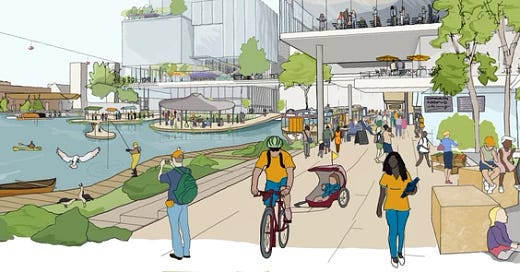Why Sidewalk Toronto wouldn't have been canceled if it were announced today
A lot has happened in the world since 2017, when Alphabet's Sidewalk Labs first announced its Toronto Quayside project with pomp and circumstance.
Editor’s note: My apologies for the delay in a new post. Shortly after I launched this, some urgent personal things came up, taking away much of my focus. I will be trying to get back to regularly scheduled programming now!
It’s hard to believe that it’s been nearly seven years since Google’s parent company, Alphabet, announced that it chose to build its first Sidewalk Labs project in Toronto after searching the globe for the best fit.
I had exclusive interviews with both CEOs of Sidewalk Labs and Waterfront Toronto ahead of the announcement, and they were giddy with excitement while citing Walt Disney’s original vision of EPCOT in Florida as a major inspiration for the project. All three levels of government joined the press conference to announce their support of the project, which would turn an area of the waterfront in Toronto’s east end into a futuristic smart city that tested new technologies and studied societal behaviours in an attempt to solve urban design problems.
The initial concept for Sidewalk Labs was arguably groundbreaking. It aimed to implement AI-driven energy systems, autonomous transport, and smart buildings while prioritizing environmental sustainability and urban innovation. Toronto’s tech community loved that Alphabet chose Toronto to do this, further adding to the ongoing narrative about the city's tech boom.
But despite its potential, and as we all know now, the project faced backlash over data privacy concerns and the governance of collected information. Critics feared a dystopian surveillance state where every street corner and park bench was a node in a vast, data-harvesting network. Media, politicians, and everyday Torontonians kept brushing Sidewalk Labs with the same brush as Google, and they said they didn’t trust Google.
And so, the project was cancelled in 2020. There’s been a book about its failings, and then that book was turned into a satirical play on stage. Sidewalk Toronto has largely been the butt of many jokes over the years, but oh how things have changed since 2017.
Society more accepting of tech
The narrative around AI and technology has dramatically evolved (oh hi, ChatGPT). Society's comfort level with AI has soared, thanks to its integration into everyday life — from AI assistants and smart home devices to advanced healthcare diagnostics and personalized learning platforms.
The global pandemic further accelerated this acceptance, as technology became a lifeline to society — enabling remote work, education, and social connections.
Public discourse on data privacy and ethical AI has also matured, thanks to remote work and the rapid growth of generative AI. There's recognition of the need for robust, transparent governance frameworks that protect individual rights while enabling the societal benefits of technology.
If Sidewalk Labs were introduced now, with clear, stringent data policies and community-driven oversight, it could very well alleviate past concerns and foster trust. Our collective experience with technology during these past several years has shifted perceptions, highlighting the potential benefits while acknowledging and addressing the challenges.
Climate and demographics
The current climate crisis and urban challenges have underscored the need for innovative solutions. While climate change and sustainability have long been discussed, public support for tackling the issues has grown since the pandemic, especially during the last few years of intense weather patterns. Sidewalk Labs' vision of reducing carbon emissions, managing waste efficiently, and creating adaptive public spaces resonates more deeply today as cities grapple with these pressing issues worldwide. Perhaps this element of the project’s pitch would have been more of a selling point now.
Then there’s the fact that younger, tech-adopting generations are now seven years older since the original announcement of Sidewalk Toronto. Many of them are working, voting, and wanting to get more involved in making the world a better place, all while embracing and understanding the latest technology. If they were polled, I would have no doubt that younger generations would be supportive of a project like Sidewalk Toronto when they understand how it would work and the potential tradeoffs for its benefits.
I’m not saying with full certainty that Sidewalk Toronto would have broken ground if announced in 2024, but today's world is markedly different from 2017. We've come a long way in understanding that with the right rules, we can enjoy tech without feeling like we're in an episode of Black Mirror (mostly). If Sidewalk Labs were to have pitched its idea today, I bet critics would have been more receptive thanks to a higher comfort level with AI, pressing global issues, and the support of younger constituents.
Sidewalk Labs' vision of a techy, green, and efficient city could very well have been exactly what we're looking for and needed now knowing what we know. Perhaps it was just ahead of its time.






